 (4 / 5)
(4 / 5)
In Pain & Glory, Pedro Almodóvar strips away the kitsch and melodrama for an understated study of what can happen when pain interferes with passion.
Even if you have only a passing knowledge of Almodóvar’s work – mine is pretty much limited to his greatest hits – or his upbringing, Salvador Mallo (Antonio Banderas, in their eighth collaboration) is in inescapably his proxy. For instance, the poster for “Sabor”, one of Salvador’s early works, is very much of Almodóvar’s oeuvre: striking red background, a literal strawberry tongue poking up suggestively from between full, cherry-red lips.
Though a renowned auteur, he spends his days shuffling around his well-lit, well-appointed Madrid home, slightly stooped from back problems; barely able to take a sip of water without setting off a choking fit. In one of the film’s few stylistic flourishes, Salvador narrates his litany of medical troubles – tinnitus, wheezing, headaches – illustrated by a series of pulsing, flaring medical scans, which give way to a tableaux midway between ancient Greek statuary and a BodyWorld exhibition. Even so, he retains his independence: Salvador, we get the impression, is not dependent on other people, apart from his assistant Zulema (Cecilia Roth).
A retrospective on one of his early works, the aforementioned Sabor, prompts Salvador to seek out its lead actor, Alberto (Asier Etxeandia), whom he has not seen since the premiere some thirty years before. What so infuriated Salvador then – Alberto’s dependency on heroin, which influenced his performance – now becomes a means of controlling pain. “Chasing the dragon” is less a source of immediate, or even implied, danger than a means of passage.
Using water as a medium, we flash back to Salvador’s childhood in Paterna, Spain – the clear blue of a swimming pool to the muddy brown riverbank where his mother (Penélope Cruz) washed clothes with their neighbours half a century before, singing as they work. Water plays a role in his sexual awakening as the sight of handsome handyman-cum-student Vicente (César Vicente) bathing himself from a tin tub sends child Salvador into a faint.
These formative experiences throw Salvador’s present-day disquiet, lent subtle weight by Banderas’ world-weary bemusement as a man coming to terms with his own inadequacies – he won Best Actor at Cannes. More akin to Bergman’s Wild Strawberries than Fellini’s 8 1/2, the film that reportedly inspired it, Pain & Glory is not so much bittersweet – like Salvador, it’s admirably clear-eyed, even-handed, unsentimental in its slight melancholy.
There’s a gentleness and a wistfulness to Pain & Glory that has stuck with me the last few days. Salvador warns Alberto that the monologue he seeks to perform – written by Salvador and based on his early years as a filmmaker – may veer into melodrama, but the film, and indeed Alberto’s performance of said text, never do. Composer Alberto Iglesias’ score, with its plaintive woodwind, plangent strings, and lively piano, underscores and elevates its naturalism.
There are conversations, between the middle-aged Salvador and now-aged mother (Julieta Serrano), in which he admits ruefully to not being the son she might have wanted; an almost-Platonic meeting with a former partner, Federico (Leonardo Sbaraglia), whom he gave up for lost a lifetime ago – ironically due to Federico’s heroin addiction. All the characters are bonded by the sense of life being not quite as they desired, but perhaps endurable.
A minor meditative, self-reflective piece, Pain & Glory feels like a filmmaker’s move from cocaine to heroin – a young man’s drug, a stimulant, a source of inspiration and glory, to a narcoleptic, something to dull the pain of age. It’s a coming to terms; not grand but honest. “Slight” is, again, the word, but that’s no criticism here: for a filmmaker like Almodóvar, who made a career of elevating camp into high art, it’s a remarkable, even astonishing, change of pace.
